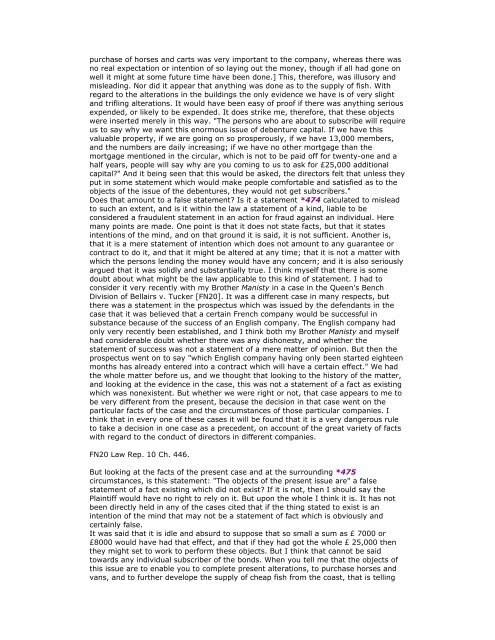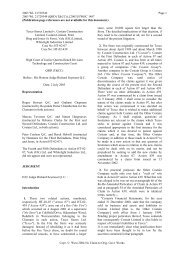Edington v Fitzmaurice - Thomson Reuters
Edington v Fitzmaurice - Thomson Reuters
Edington v Fitzmaurice - Thomson Reuters
Create successful ePaper yourself
Turn your PDF publications into a flip-book with our unique Google optimized e-Paper software.
purchase of horses and carts was very important to the company, whereas there wasno real expectation or intention of so laying out the money, though if all had gone onwell it might at some future time have been done.] This, therefore, was illusory andmisleading. Nor did it appear that anything was done as to the supply of fish. Withregard to the alterations in the buildings the only evidence we have is of very slightand trifling alterations. It would have been easy of proof if there was anything seriousexpended, or likely to be expended. It does strike me, therefore, that these objectswere inserted merely in this way. "The persons who are about to subscribe will requireus to say why we want this enormous issue of debenture capital. If we have thisvaluable property, if we are going on so prosperously, if we have 13,000 members,and the numbers are daily increasing; if we have no other mortgage than themortgage mentioned in the circular, which is not to be paid off for twenty-one and ahalf years, people will say why are you coming to us to ask for £25,000 additionalcapital?" And it being seen that this would be asked, the directors felt that unless theyput in some statement which would make people comfortable and satisfied as to theobjects of the issue of the debentures, they would not get subscribers."Does that amount to a false statement? Is it a statement *474 calculated to misleadto such an extent, and is it within the law a statement of a kind, liable to beconsidered a fraudulent statement in an action for fraud against an individual. Heremany points are made. One point is that it does not state facts, but that it statesintentions of the mind, and on that ground it is said, it is not sufficient. Another is,that it is a mere statement of intention which does not amount to any guarantee orcontract to do it, and that it might be altered at any time; that it is not a matter withwhich the persons lending the money would have any concern; and it is also seriouslyargued that it was solidly and substantially true. I think myself that there is somedoubt about what might be the law applicable to this kind of statement. I had toconsider it very recently with my Brother Manisty in a case in the Queen's BenchDivision of Bellairs v. Tucker [FN20]. It was a different case in many respects, butthere was a statement in the prospectus which was issued by the defendants in thecase that it was believed that a certain French company would be successful insubstance because of the success of an English company. The English company hadonly very recently been established, and I think both my Brother Manisty and myselfhad considerable doubt whether there was any dishonesty, and whether thestatement of success was not a statement of a mere matter of opinion. But then theprospectus went on to say "which English company having only been started eighteenmonths has already entered into a contract which will have a certain effect." We hadthe whole matter before us, and we thought that looking to the history of the matter,and looking at the evidence in the case, this was not a statement of a fact as existingwhich was nonexistent. But whether we were right or not, that case appears to me tobe very different from the present, because the decision in that case went on theparticular facts of the case and the circumstances of those particular companies. Ithink that in every one of these cases it will be found that it is a very dangerous ruleto take a decision in one case as a precedent, on account of the great variety of factswith regard to the conduct of directors in different companies.FN20 Law Rep. 10 Ch. 446.But looking at the facts of the present case and at the surrounding *475circumstances, is this statement: "The objects of the present issue are" a falsestatement of a fact existing which did not exist? If it is not, then I should say thePlaintiff would have no right to rely on it. But upon the whole I think it is. It has notbeen directly held in any of the cases cited that if the thing stated to exist is anintention of the mind that may not be a statement of fact which is obviously andcertainly false.It was said that it is idle and absurd to suppose that so small a sum as £ 7000 or£8000 would have had that effect, and that if they had got the whole £ 25,000 thenthey might set to work to perform these objects. But I think that cannot be saidtowards any individual subscriber of the bonds. When you tell me that the objects ofthis issue are to enable you to complete present alterations, to purchase horses andvans, and to further develope the supply of cheap fish from the coast, that is telling
















